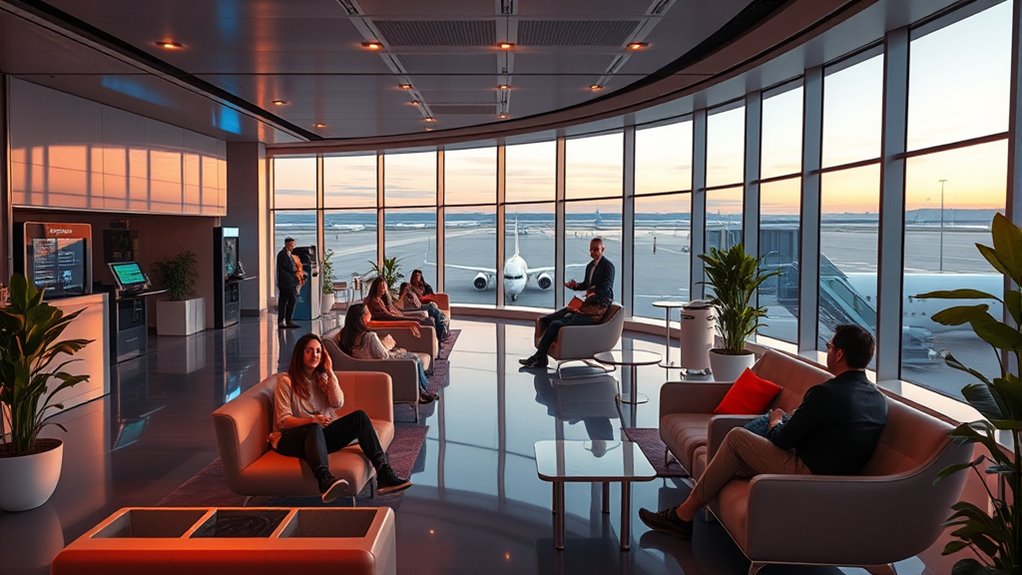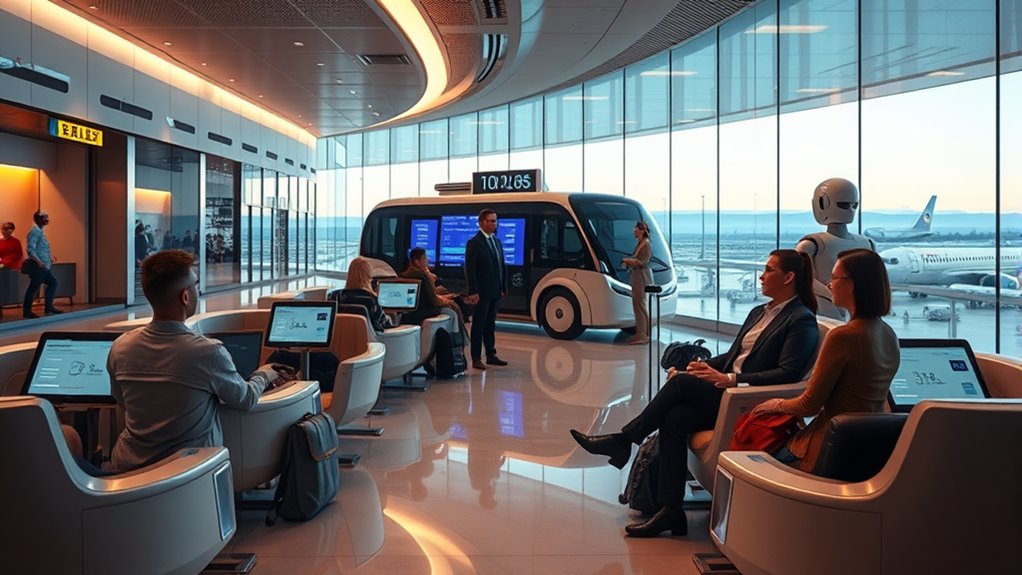By 2025, the travel and hospitality industry will have shifted to prioritize sustainability, with airlines investing in fuel-efficient aircraft and hotels adopting eco-friendly practices. Digital tools will enhance your experiences through apps, virtual previews, and contactless payments, making travel smoother and safer. Safety measures like contactless tech and smarter hotel systems will be central. If you want to explore how these innovations will shape your future trips, there’s plenty more to discover ahead.
Key Takeaways
- The industry is shifting towards sustainable practices, with airlines and hotels adopting eco-friendly initiatives and resource-saving technologies.
- Digital tools like mobile apps, virtual reality, and contactless systems are enhancing personalized travel experiences and safety.
- Post-pandemic recovery emphasizes safety and hygiene, integrating contactless, digital, and smart technology solutions.
- Industry resilience is driven by innovation, focusing on responsible, sustainable, and digitally optimized travel options.
- Advanced technology supports sustainability goals by reducing resource waste, lowering emissions, and enabling smarter operations.

Ever wondered what the future of travel holds? As the world continues to recover from the pandemic, the travel and hospitality industry is transforming rapidly, shaping a more resilient and innovative landscape by 2025. One of the most significant shifts is the emphasis on sustainable tourism. Travelers are becoming increasingly conscious of their environmental impact, prompting companies to adopt greener practices. You’ll notice airlines investing in fuel-efficient aircraft and exploring alternative energy sources, while hotels implement eco-friendly initiatives like energy-saving systems and waste reduction programs. This shift isn’t just about corporate responsibility; it’s about meeting traveler expectations for more responsible travel options. Sustainable tourism is no longer a niche but a core component of industry strategy, ensuring that destinations can thrive long-term without compromising their natural and cultural resources.
Alongside this, digital transformation is revolutionizing how you experience travel. From booking to arrival, technology streamlines every step, making the process more intuitive and personalized. Imagine using mobile apps to customize your travel itinerary, access real-time updates, or even check into hotels without standing in lines. Virtual reality previews of destinations help you make informed choices before booking, enhancing your overall experience. Contactless payments and digital keys are becoming standard, reducing physical contact and increasing convenience. Artificial intelligence-powered chatbots provide instant support for questions or issues, making customer service more efficient. These innovations aren’t just about convenience—they also contribute to safer, more hygienic travel environments, which remains a priority post-pandemic.
The digital transformation also supports sustainability efforts. Smart systems in hotels can optimize energy use based on occupancy, reducing waste and lowering carbon footprints. Airlines leverage data analytics to improve routes, cut emissions, and enhance operational efficiency. Additionally, the integration of advanced home technology into hospitality services is making stays more comfortable and energy-efficient. You’ll find that these technological advancements are making travel more sustainable by reducing resource consumption and enabling smarter, more responsible choices.
Frequently Asked Questions
How Will Travel Insurance Policies Evolve Post-Pandemic?
You’ll see travel insurance policies evolve with increased coverage enhancements and streamlined digital claim processing. Insurers will focus on offering broader coverage for pandemic-related disruptions, cancellations, and health emergencies. Expect more user-friendly digital platforms that make filing claims quick and easy, reducing wait times. These changes will give you greater peace of mind, ensuring your travel plans are better protected and more efficiently managed in the post-pandemic world.
What New Safety Technologies Will Hotels Implement by 2025?
By 2025, you’ll notice hotels adopting advanced safety tech like contactless check-in, which speeds up your arrival and minimizes contact. Smart room technology will also become standard, allowing you to control lighting, temperature, and even request services via voice or app, reducing physical interactions. These innovations enhance safety and convenience, giving you peace of mind while enjoying a seamless, personalized stay.
How Will Loyalty Programs Change to Attract Travelers?
You’ll see loyalty programs evolve with advanced personalization strategies that tailor rewards to your preferences, making each stay more relevant. Digital engagement will play a key role, offering seamless app experiences, instant rewards, and interactive features that keep you connected. These changes aim to boost your engagement, making it easier and more rewarding to choose your favorite hotels, ultimately fostering stronger loyalty through customized benefits and innovative technology.
What Emerging Destinations Will Gain Popularity After COVID-19?
You’ll find emerging destinations gaining popularity, with a 45% increase in travelers exploring lesser-known places post-pandemic. Post-pandemic attractions like rural retreats, eco-friendly resorts, and cultural hotspots will draw more visitors. These emerging destinations offer authenticity and safety, making them perfect for your next trip. Keep an eye on hidden gems and off-the-beaten-path locations, as they’ll become your new favorite spots for unique experiences and social distancing.
How Will Airline Pricing Strategies Shift in the Next Two Years?
You’ll see airline pricing strategies shift toward more dynamic fare modeling, letting airlines adjust prices in real-time based on demand, competition, and booking patterns. Ancillary revenue strategies will also play a bigger role, encouraging you to add services like baggage, seat selection, or upgrades. This approach helps airlines maximize revenue while offering more personalized options, making your booking experience more flexible and tailored to your travel needs.
Conclusion
By 2025, you’ll find travel and hospitality transformed—more personalized, seamless, and tech-driven. Some might worry these changes could make experiences less authentic, but in reality, they’ll bring you closer to genuine connections and tailored adventures. Embrace these innovations, and you’ll enjoy smoother bookings, safer journeys, and memorable stays. The future isn’t about losing authenticity; it’s about enhancing your journey and making travel more accessible, enjoyable, and meaningful than ever before.










